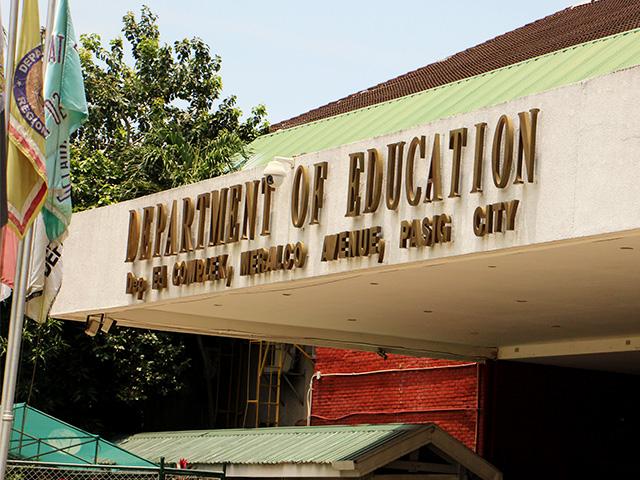
Fifty six (56) out of the 100 public schools did not report any COVID-19 infection among their students and teachers for the first week of the pilot implementation of face-to-face classes, the Department of Education said Tuesday.
“Sa unang linggo ng ating pagpapatupad ng pilot limited face-to-face [classes] ay wala po tayong naitalang kaso ng COVID sa mga lugar na ito,” Assistant Secretary Malcolm Garma said at a press conference.
“As we have emphasized, we have so far gathered information from 56 out of the 100 for the 100 public schools,” Garma added.
(In the first week of our implementation of the pilot limited face-to-face [classes], we did not record any COVID cases in the areas.)
“Sa kabuuan, doon po sa 100 pampublikong paaralan, 56 po rito ang nakakapag-submit ng kanilang weekly school report. At inaasahan po natin ‘yung iba hong paaralan ay makapag-submit na rin within the day,” Garma said.
“Pero masasabi naman natin na 56 out of the 100, so more than 50 percent na ‘yung ating mga paaralan na nakapag-submit ng kanilang assessment report,” he added.
(In total, out of 100 public schools, 56 have submitted their weekly school report. And we expect that other schools will be able to submit within the day. But we can say that 56 out of the 100, or more than 50 percent of our schools have submitted their assessment report.)
Some public schools have also reported the challenges faced by students in participating in the pilot face-to-face classes.
Garma reported that of the 56 schools, 18 reported that some students were not able to participate due to sickness (fever, cough, cold, etc.); seven (7) reported their students had absences due to inaccessibility of their homes to schools; 11 reported students having to attend their family obligations or errands; three (3) said students were not able to go due to natural calamities; and 11 said some of their students were unready to attend classes.
Garma said that during classes, some kindergarten learners had difficulty wearing their masks all the time.
“Isa ito sa mga bagay na gusto nating talagang ma-integrate sa ating face-to-face learning, na masanay at maunawaan ng ating mga maliliit na mag-aaral kung bakit kailangan na palaging suot ‘yung kanilang face masks,” he said.
(This is one of the things that we really want to integrate into the face-to-face learning, for our young students to get used to and understand why they need to always wear their face masks.)
“First time po ng mga bata na bumalik at tumungtong sa school, first time nilang makasalamuha ‘yung kanilang mga kaklase, ngayon lang sila makaka-interact with their teachers. So hindi maiiwasan ang ating mga pupils ay hindi talaga mapapanatili sa upuan lamang, talagang tatayo sila, maglalakad, maglalaro,” Garma said, adding that DepEd is already looking into their response to the situation.
(It’s the first time the children came back to school, it’s the first time they interacted with their classmates and teachers. Our pupils could not avoid just sitting on their chairs, they will stand, walk and play.)
Garma called on adults to serve as examples for students in wearing face masks, as some people around the public schools were reported to be not wearing their face masks.
Education Secretary Leonor Briones said the figures on the challenges faced by some public schools should still be seen based on the overall picture of the assessment of the pilot face-to-face classes.
“The temptation might be to emphasize what the challenges are na kung i-proportion mo ‘yan sa more than 100,000 teachers na nagbigay ng feedback, hindi naman gano’n kalaki… Pero overall, it was expected na kitang kita naman na lahat-lahat natutuwa,” Briones said.
(The temptation might be to emphasize what the challenges are, but if you will proportion it to the more than 100,000 teachers who gave their feedback, it’s not that significant… Overall, it was expected, it was evident that everyone is happy.)
NCR
As for the National Capital Region (NCR) participating in the pilot face-to-face classes, Briones said they already have their list of schools, but it will still depend on the region’s risk assessment for COVID-19.
“As for NCR, it really depends on the risk assessment,” Briones said. “There is always that fear at the back of our minds, but we cannot always be afraid of fear, we have to confront it and we have to deal with it, we have to identify where the fear is coming from. The crucial thing here in NCR is the risk assessment.”
While there are NCR mayors who are still hesitant to conduct face-to-face classes, Briones said Taguig City has agreed to qualify their four international schools to participate.
DepEd officials said they are eyeing to submit their assessment of the pilot implementation of the face-to-face classes in January next year.
“After December we will make the overall assessment, then we decide to further expand. Our hope is by next year, the opening of classes is already significant, depending on the behavior of COVID,” Briones said.
“The original timeline is March, but because we thought of shortening the pilot study, we can already make an assessment, submit our report to the president in preparation for the expansion come January,” Garma said. — RSJ, GMA News

0 Comments